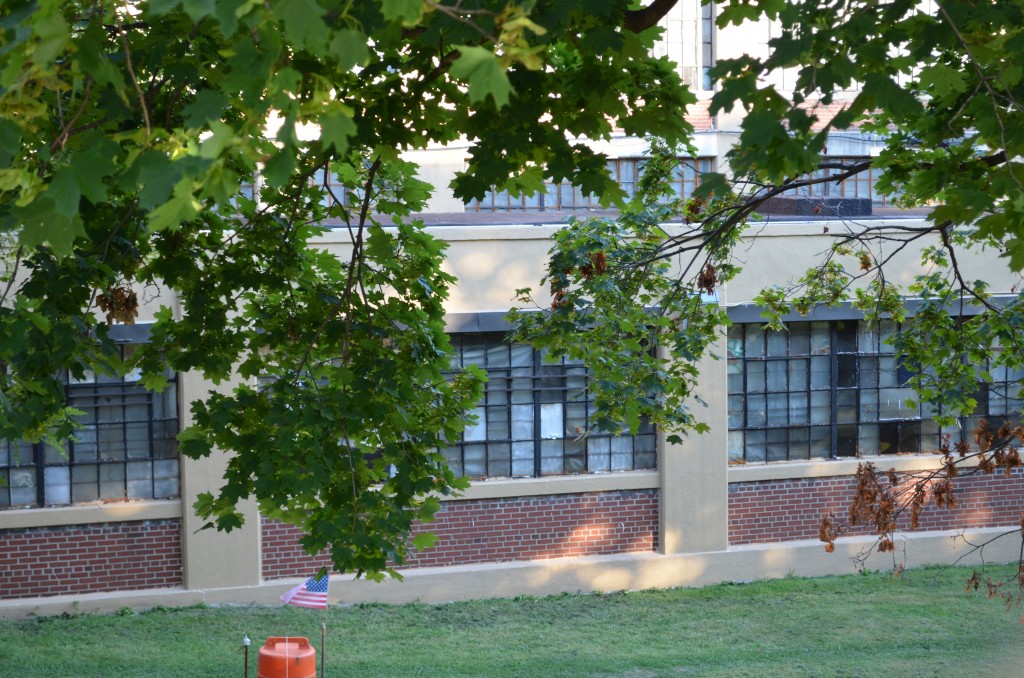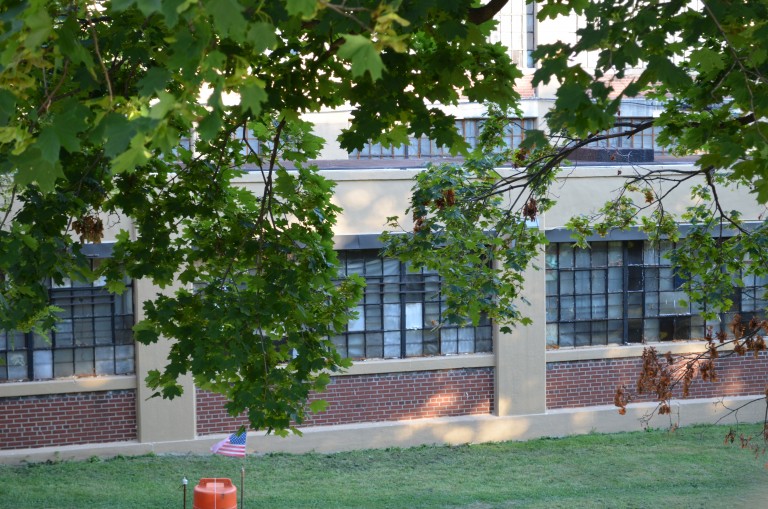
This former knitting mill, which has been vacant for about 20 years, could possibly be transformed into a homeless shelter. Forum Newsgroup photo by Natalia Kozikowska.
Glendale residents were shaken after news broke that a not-for-profit agency expressed their interest in purchasing a former knitting mill on Cooper Avenue and turning it into a homeless shelter.
The property, located at 78-16 Cooper Avenue in Glendale, is owned by Michael Wilner of Wilner Management Realty. According to a posting on Facebook, City Councilwoman Elizabeth Crowley (D-Middle Village) contacted the owner and was able to confirm that his real estate agency had, indeed, been in contact with a not-for-profit that runs homeless shelters but would not provide the name of the organization. Wilner refused to comment.
Although a not-for-profit agency did approach Wilner Realty about the vacant building, Lydon Sleeper, Crowley’s Chief of Staff, said that not a single agency has approached the city regarding a proposal.
“We know a group that runs other shelters in the City has reached out to the owner, but the Councilmember does not support any attempt to put a multiple dwelling shelter on Cooper Avenue and will do everything in her power to prevent it from opening,” Sleeper said.
In an effort to protest the opening of a shelter, Eric Yun, Communications Director for Crowley, said the Councilmember is circulating a petition.
The New York City Department of Homeless Services (DHS) must follow a complex legal process before any application for a shelter is approved. Additionally, notification of Community Board 5 is required.
Chairperson of Community Board 5, Vincent Arcuri, assured that he had not received any formal proposal for a homeless shelter in Glendale.“We’ve spoken with the mayor’s office and they all professed no knowledge and interest in it,” he said in a statement. A DHS spokesperson, Heather Janik, also confirmed that Homeless Services has not received an application for a shelter in the Glendale area.
Still, the news that a homeless shelter could possibly emerge on Cooper Avenue stunned Glendale residents like Danielle Lopez, who said that she would be extremely unhappy if the city approved an institution like this near her home. “Not only will my house value drop but this could potentially be dangerous to the people that live here,” she said.
Other neighbors also expressed serious concern. George Frankowski, who has lived in Glendale for more than ten years, hopes that his area can join together and fight the shelter. “This something that might affect the neighborhood… and I’m raising two kids here,” he said.
Another Glendale native, Stephanie Marco, believes that the space should be used differently. “I should only hope that our representatives are fighting to keep this from happening. That building can be used in other, better ways. It’s a big space,” she said.
Consensus among community residents, civic leaders think the 105,000 square-foot facility would be better suited for other purposes. A recreation center is something that was suggested by the councilmember’s office.
The property, which has been vacant for about 20 years, is zoned for M1-1 – manufacturing use but non-residential use. In theory, this zone is meant to bring economic opportunity to its community. However, the land-use laws have previously allowed hotels and shelters into the zone.
President of the Glendale Civic Association, Kathy Masi vehemently opposes a shelter and is convinced that if the people of Glendale join together, they can block the move. “There’s enough community resistance that the elected officials will do something about this administratively so it doesn’t happen,” she said.
This is not the first time a community has joined together to fight against homeless shelters in neighborhoods. In June, a group of residents and business owners in Greenpoint, Brooklyn, hired an attorney in hopes of stopping the establishment of a 200-bed men’s homeless shelter. And in August of 2009, residents of Elmhurst also protested having a homeless shelter placed in the neighborhood.
By Natalia Kozikowska

